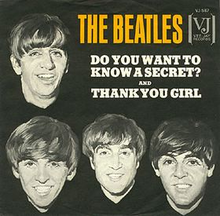
Please Please Me is the debut studio album by the English rock band the Beatles. Produced by George Martin, it was released in the UK on EMI's Parlophone label on 22 March 1963. The album is 14 songs in length, and contains a mixture of cover songs and original material written by the partnership of band members John Lennon and Paul McCartney.

"Get Back" is a song recorded by the British rock band the Beatles and Billy Preston, and written by Paul McCartney though credited to the Lennon–McCartney partnership. It was originally released as a single on 11 April 1969 and credited to "The Beatles with Billy Preston". The song is one of the few examples of John Lennon featuring prominently as lead guitarist. The album version of this song contains a different mix that features a studio chat between Paul McCartney and John Lennon at the beginning which lasts for 20 seconds before the song begins, also omitting the coda featured in the single version, and with a final dialog taken from the Beatles' rooftop concert. This version became the closing track of Let It Be (1970), which was released just after the group split up. The single version was later issued on the compilation albums 1967–1970, 20 Greatest Hits, Past Masters, and 1.
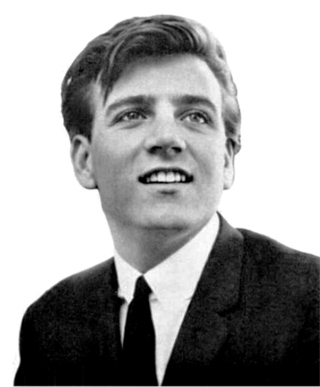
William Howard Ashton, known professionally as Billy J. Kramer, is an English pop singer. With The Dakotas, Kramer was managed by Brian Epstein during the 1960s and scored hits with several Lennon–McCartney compositions never recorded by the Beatles, among them the UK number one "Bad to Me" (1963). Kramer and the Dakotas had a further UK chart-topper in 1964 with "Little Children" and achieved U.S. success as part of the British Invasion. Since the end of the beat boom, Kramer has continued to record and perform. His autobiography, Do You Want to Know a Secret, was published in 2016.

"Let It Be" is a song by the English rock band the Beatles, released on 6 March 1970 as a single, and as the title track of their album Let It Be. It was written and sung by Paul McCartney, and credited to the Lennon–McCartney partnership. The single version of the song, produced by George Martin, features a softer guitar solo and the orchestral section mixed low, compared with the album version, produced by Phil Spector, featuring a more aggressive guitar solo and the orchestral sections mixed higher.

"From Me to You" is a song by the English rock band the Beatles that was released in April 1963 as their third single. It was written by Paul McCartney and John Lennon. The song was the Beatles' first number 1 hit on what became the official UK singles chart but the second, after "Please Please Me", on most of the other singles charts published in the UK at the time. "From Me to You" failed to make an impact in the United States at the time of its initial release. Instead, a 1963 cover version released by Del Shannon resulted in the song's becoming the first Lennon–McCartney track to enter the US pop charts. The Beatles' original was rereleased in the US in January 1964 as the B-side to "Please Please Me", and reached number 41.
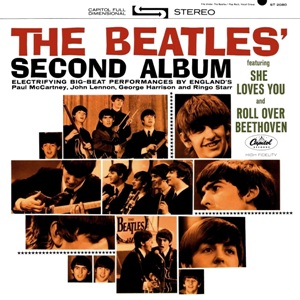
The Beatles' Second Album is the second Capitol Records album by the English rock band the Beatles, and their third album released in the United States including Introducing... The Beatles, which was issued three months earlier by Vee-Jay Records. Following its release in April 1964, The Beatles' Second Album replaced Meet the Beatles! at number 1 on the Billboard Top LPs chart in the US. The album was compiled mostly from leftover tracks from the UK album With the Beatles and Long Tall Sally EP, which are predominantly rock and roll and R&B covers, and rounded out with several Lennon-McCartney-penned non-album b-sides and the hit single "She Loves You". Among critics, it is considered the band's purest rock and roll album and praised for its soulful takes on both contemporary black music hits and original material.
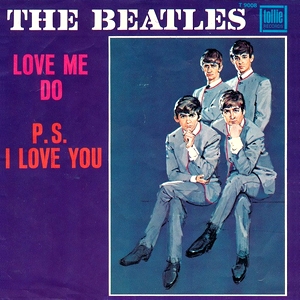
"Love Me Do" is the debut single by the English rock band the Beatles, backed by "P.S. I Love You". When the single was originally released in the United Kingdom on 5 October 1962, it peaked at number 17. It was released in the United States in 1964 and topped the nation's song chart. Re-released in 1982 as part of EMI's Beatles 20th anniversary, it re-entered the UK charts and peaked at number 4. "Love Me Do" also topped the charts in Australia and New Zealand.
"Across the Universe" is a song by the English rock band the Beatles. It was written by John Lennon and credited to Lennon–McCartney. The song first appeared on the 1969 various artists' charity compilation album No One's Gonna Change Our World and later, in a different form, on their 1970 album Let It Be, the group's final released album. The original version featured on two different albums both titled Rarities: a 1978 British release and a 1980 US release. It was also included on their 1988 album Past Masters, Volume Two. The song has been covered by many artists, including David Bowie on his 1975 album Young Americans, which featured contributions from Lennon.

"Please Please Me" is a song released by the English rock band the Beatles. It was their second single in the United Kingdom, and their first in the United States. It is also the title track of their first LP, which was recorded to capitalise on the success of the single. It is a John Lennon composition, although its ultimate form was significantly influenced by producer George Martin.

"Things We Said Today" is a song by the English rock band the Beatles, written by Paul McCartney and credited to Lennon–McCartney. It was released in July 1964 as the B-side to the single "A Hard Day's Night" and on their album of the same name, except in North America, where it appeared on the album Something New. The band recorded the song twice for BBC Radio and regularly performed an abbreviated version during their 1964 North American tour.
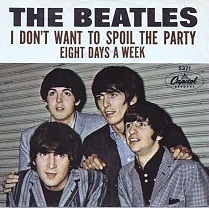
"I Don't Want to Spoil the Party" is a song by the English rock band the Beatles, written by John Lennon and credited to Lennon–McCartney. It was released on the album Beatles for Sale in the United Kingdom in December 1964. "I Don't Want to Spoil the Party" was also released on the Beatles for Sale EP.

"Don't Bother Me" is a song by the English rock band the Beatles from their 1963 UK album With the Beatles. It was the first song written by George Harrison, the group's lead guitarist, to appear on one of their albums. A midtempo rock and roll song, it was originally released in the United States on the 1964 album Meet the Beatles!
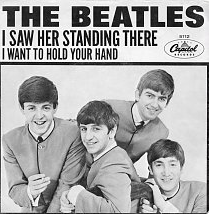
"I Saw Her Standing There" is a song by the English rock band the Beatles, written by Paul McCartney and John Lennon. It is the opening track on the band's 1963 debut UK album Please Please Me and their debut US album Introducing... The Beatles.

"Ask Me Why" is a song by the English rock band the Beatles originally released in the United Kingdom as the B-side of their single "Please Please Me". It was also included on their 1963 debut album Please Please Me. It was written primarily by John Lennon and credited to the Lennon–McCartney partnership.
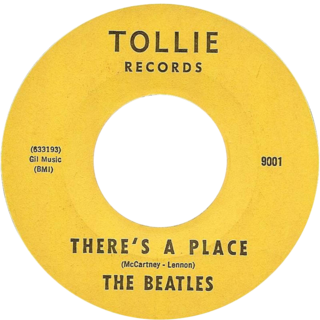
"There's a Place" is a song by the English rock band the Beatles from their debut album, Please Please Me, released in March 1963. It was written primarily by John Lennon and credited to McCartney–Lennon. In the United States, the song was released in July 1963 on the group's first US LP, Introducing... The Beatles, later reissued in January 1964 as Beatlemania surged there. It was also issued as a non-album single in the US, in March 1964, as the B-side to "Twist and Shout", reaching number 74 in the Billboard Hot 100.

"In Spite of All the Danger" is the first song recorded by the Quarrymen, then consisting of John Lennon, Paul McCartney, George Harrison, pianist John Lowe, and drummer Colin Hanton.
"I'll Be on My Way" is a song written by Paul McCartney, credited to Lennon–McCartney, first released on 26 April 1963 by Billy J. Kramer with the Dakotas as the B-side of their hit debut single "Do You Want to Know a Secret", a song also written by Lennon–McCartney. The single reached number two in the UK charts while "From Me to You" by the Beatles occupied the number 1 position. The Beatles recorded a version of the song on 4 April 1963 for BBC radio, first released on the 1994 compilation album Live at the BBC.

The Chipmunks Sing the Beatles Hits is a tribute album of Alvin and the Chipmunks singing the hits of the Beatles. It was originally released in 1964 by Liberty Records on vinyl record, and consists of Chipmunk renditions of early Beatles hits.
"From a Window" is a song written by Paul McCartney, attributed to John Lennon and Paul McCartney, which was recorded by Billy J. Kramer with The Dakotas. It was the last of six Lennon–McCartney compositions recorded by Kramer.

"Komm, gib mir deine Hand" and "Sie liebt dich" are German-language versions of "I Want to Hold Your Hand" and "She Loves You", respectively, by the English rock band the Beatles. Both John Lennon and Paul McCartney wrote the original English songs, credited to the Lennon–McCartney partnership, while Camillo Felgen wrote the translated German lyrics. Felgen is credited under several of his pen names. In places, his translations take major liberties with the original lyrics. Odeon Records released the German versions together as a non-album single in West Germany in March 1964. Swan Records released "Sie liebt dich", along with the original "She Loves You" B-side "I'll Get You", as a single in the United States in May 1964. Capitol included "Komm, gib mir deine Hand" as the closing track of the 1964 North American-only album Something New.
